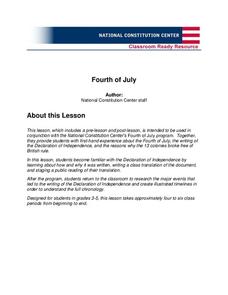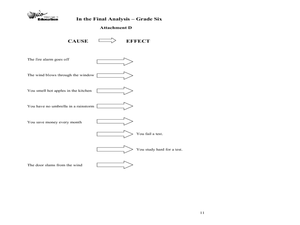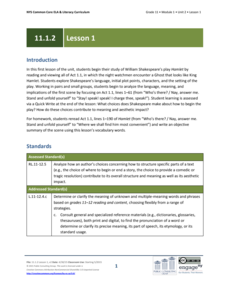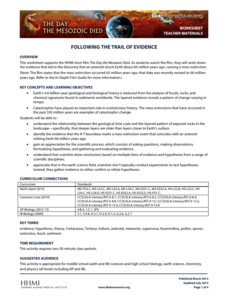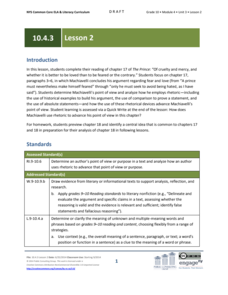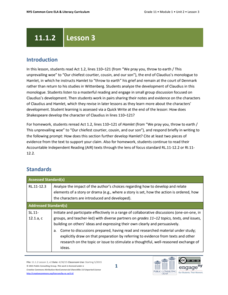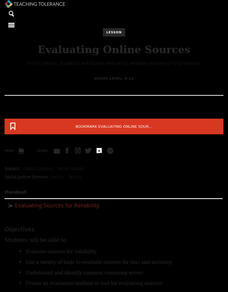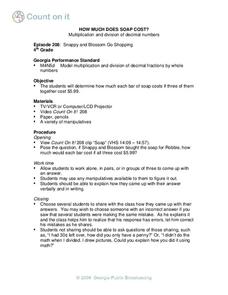Habits of Mind
Thinking Interdependently
Transform your class into a team with a lesson about thinking and working interdependently. As they reflect on important roles for a group, elementary and middle schoolers learn to work together and think of ways that compliment...
Curated OER
Maniac Magee: A 5th Grade Literature Guide
There's no need to run around trying to plan a unit for the book Maniac Magee, the work has already been done for you. Through a series of whole class, small group, and independent lessons and activities, students practice...
National Constitution Center
Fourth of July (Grades 3-5)
Bring history to life for your young scholars with a Fourth of July lesson series. After a class reading of the Declaration of Independence, students translate this pivotal document into layman's terms before working in small...
Curated OER
The Final Analysis: Cause and Effect, Fact and Opinion
Middle schoolers read and review informational texts, analyze cause and effect, and distinguish fact from opinion. They assess a "one-minute mystery" you read aloud for cause and effect relationships. Resource includes complete set of...
North Carolina State University
Pipe Cleaner Towers
Small groups work together to create a tower out of 15 pipe cleaners under a set of imposed limitations. First, restrict team members to use only one arm, and then remove the use of spoken language. There is also a time limit. The...
Virginia Department of Education
Congruent Triangles
Is this enough to show the two triangles are congruent? Small groups work through different combinations of constructing triangles from congruent parts to determine which combinations create only congruent triangles. Participants use the...
WE Charity
Elementary–Module 4: Energy and Housing
Many innovators are working on solutions to address environmental problems like energy-inefficient housing. Scholars have an opportunity to develop their own strategies using the fourth of five lessons from the WE Are...
Health Smart Virginia
Caring School Environment Performance Task
In a school scenario, pupils stay home to keep from the teasing and bullying on campus. To combat unkind behavior, small groups survey learners in other grade levels, discuss and summarize their findings, then work together to create a...
EngageNY
Grade 9 ELA Module 1, Unit 1, Lesson 13
Finish Karen Russell's "St. Lucy's Home for Girls Raised by Wolves" with an instructional activity focusing on the story's conclusion. After participating in literary analysis discussions with small groups, ninth graders complete a Quick...
EngageNY
Grade 11 ELA Module 1: Unit 2, Lesson 1
How can an author's decisions impact a text? Using an insightful resource, scholars begin their study of Hamlet by reading Act 1.1. They explore the language, characters, and setting in small groups. Upon finishing group work, pupils...
Cornell Lab of Ornithology
Jump, Glide, or Fly? Exploring Bird Evolution
How have birds evolved from prehistoric animals? With the three-part lesson, small groups first research different prehistoric animals and determine whether they are birds. Then, scholars explore different bird adaptations using the Flap...
Center for Civic Education
What Basic Ideas About Government Are Included in the Preamble to the Constitution?
Young historians explore the meaning of the Preamble to the US Constitution in this upper-elementary social studies lesson. Working with partners or in small groups, children discuss the purpose of government before reading and analyzing...
Wild BC
Is Climate Change Good for Us?
Is it really that big of a deal if the global climate undergoes a little change? Young environmentalists consider this very question as they discuss in small groups the impact of different climate change scenarios on their lives,...
WE Charity
Elementary–Module 1: Sustainable Innovation
Where would society be without the innovations of Thomas Edison or Steve Jobs? Scholars explore what it means to have an innovative mindset. Working in small groups, pupils design a product or service to help solve a social,...
Howard Hughes Medical Institute
Following the Trail of Evidence
One important skill in analyzing scientific evidence is identifying facts versus opinions. Scholars identify pieces of evidence from the film The Day the Mesozoic Died and then discuss this evidence in small groups at the end of each act...
EngageNY
Grade 10 ELA Module 2: Unit 2, Lesson 3
Does trauma have a lasting effect on people's lives? Scholars dive into the topic as they read paragraphs 9–11 of "A Genetics of Justice" by Julia Alvarez, in which the author describes her family's return to the Dominican Republic....
EngageNY
Grade 10 ELA Module 4: Unit 2, Lesson 10
Is it better to be dead than to "dwell in doubtful joy," as Lady Macbeth suggests in Act 3.2 of Shakespeare's Macbeth? Using the resource, scholars work in small groups to discuss how Lady Macbeth and Macbeth begin to unravel following...
EngageNY
Grade 10 ELA Module 4: Unit 3, Lesson 2
How do rhetorical devices advance an author's point of view? Scholars consider this question as they continue exploring Machiavelli's The Prince. They work in small groups, annotating the text for evidence of rhetoric before engaging in...
EngageNY
Grade 11 ELA Module 1: Unit 2, Lesson 3
How does Shakespeare develop the character of Claudius in the first Act of Hamlet? Using a helpful resource, pupils complete a Quick Write to answer the question. Readers also work in small groups to discuss the characters of Claudius...
Curated OER
French Revolution Unit Plan
"Let them eat cake" are the famous words attributed to Marie Antoinette, but what really caused the French Revolution? The unit plan provides 20 lessons including the worksheets needed for a complete study of the French Revolution. Young...
EngageNY
Discussing and Identifying Themes: What Makes a Good Children’s Book?
Working in small groups, scholars look closely at a children's book to evaluate narrative techniques. Next, they complete a Children's Book Scavenger Hunt worksheet to analyze the literary elements of their selected stories.
Teaching Tolerance
Evaluating Online Sources
Newspapers, television, social media ... how do people get their news? Using the informative resource, scholars locate and verify credible sources of information. Working in small groups, they discuss strategies for evaluating the...
Curated OER
How Much Does Soap Cost?
Explore multiplication and division using real life problems, including how to find the cost of soap per bar. Individuals or small groups work to find answers. They then share with the class how they found their answer.
Curated OER
Inspector Readers: The 002 Book Club
This unit introduces book clubs/literature circles to lower elementary classes, but could be adapted to higher grades. It outlines the anticipatory activity that includes a WebQuest, a discussion to clarify questions about the unit,...




